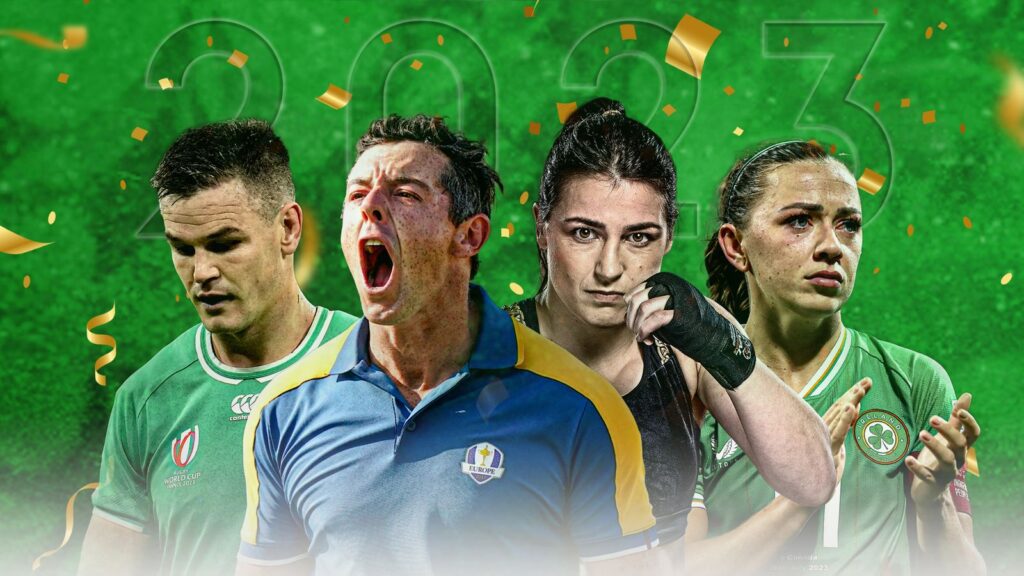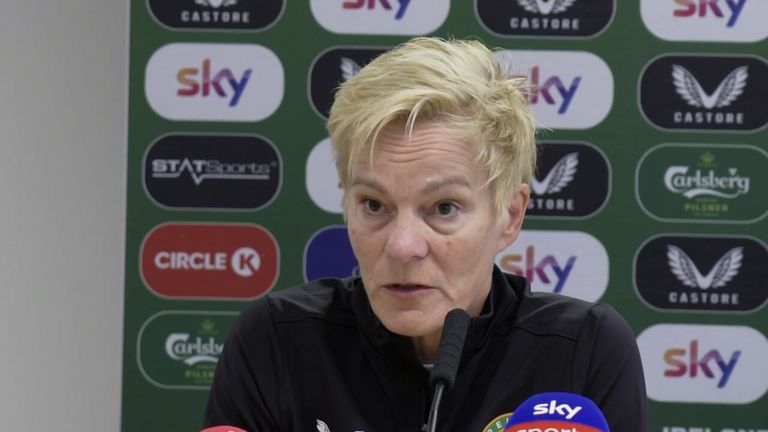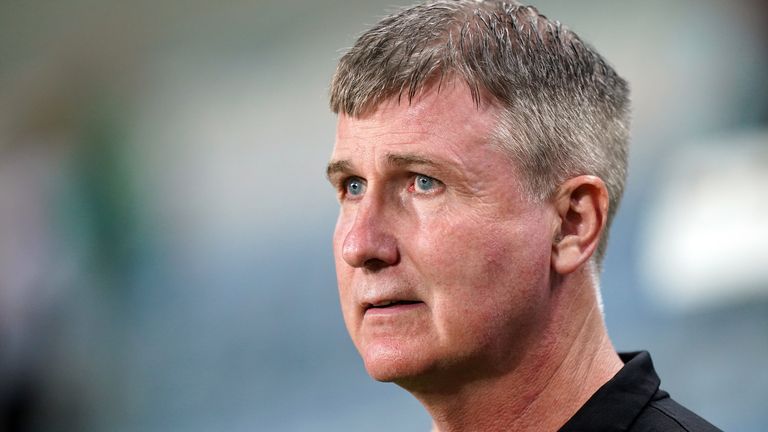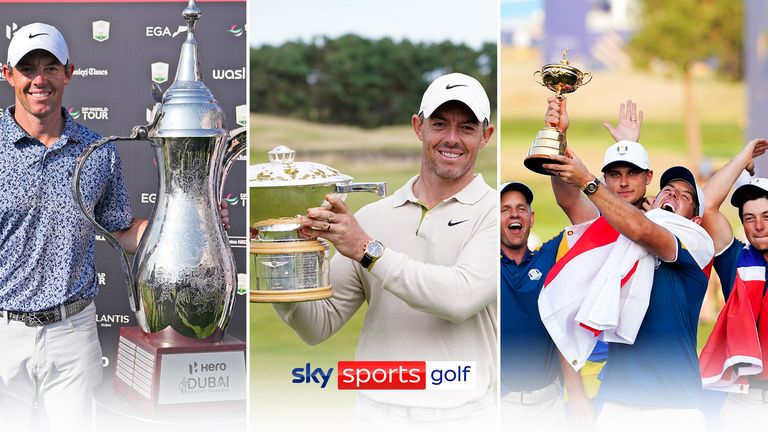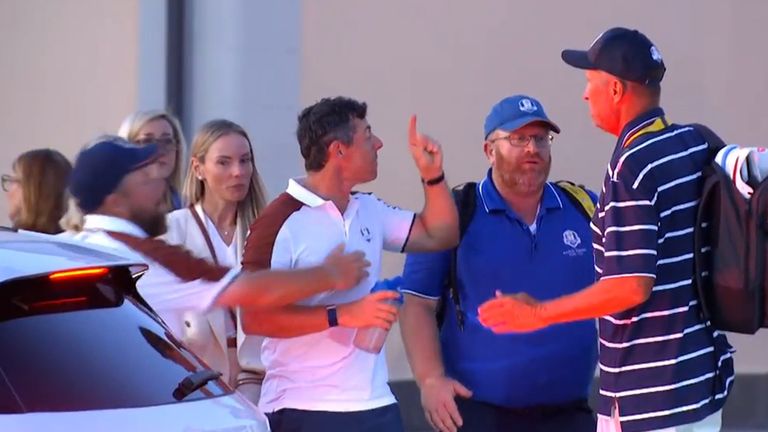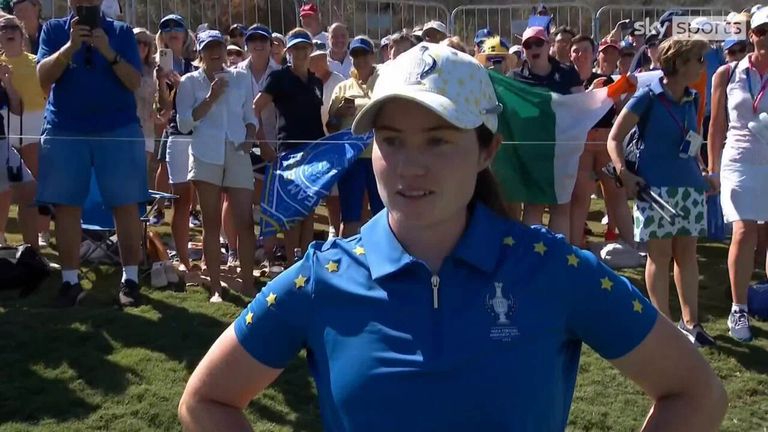Rugby elation to rugby heartache, a footballing managerial merry-go-round, golfing greatness, boxing blockbusters and so much more. The 2023 Irish sporting landscape had a little bit of everything. Here, Sky Sports takes a look back at the highs and lows of the year.
Rugby: Huge success, unprecedented hope, massive heartbreak
It was a year in Irish rugby that saw historical success, huge expectation, unprecedented hope, and ultimately, heartbreak perhaps worse than ever before.
Towards the start of the year, Andy Farrell’s Ireland – ranked world No 1 since July 2022 – secured a sensational Six Nations Grand Slam.
Wales were blown away 34-10 on the opening weekend in Cardiff to sour Warren Gatland’s homecoming, while Round 2 saw one of the best contests in the history of the championship as Ireland put in a near-perfect display to beat reigning champions France 32-19 in Dublin.
From then, Farrell’s charges were favourites for the title, seeing off Italy in Rome, Scotland at Murrayfield despite a raft of injuries, and finally, England in Dublin to lift the Six Nations trophy and Triple Crown.
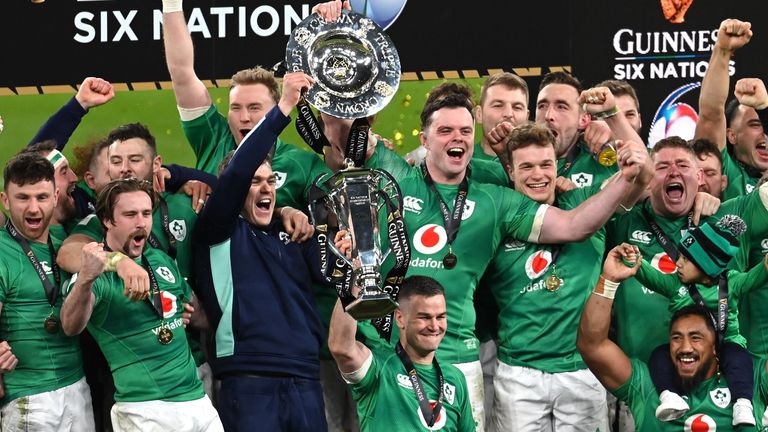
Ireland beat England on the last day of the Six Nations to clinch the Grand Slam on home soil for the first time
The warm glow continued during the pool stages of the Rugby World Cup as Ireland won all four matches, beating eventual champions South Africa in a Paris epic, and a ruthless dismantling of Scotland clinched top spot in Pool B and extended their winning streak to 17 matches.
Ireland’s quarter-final opponents were New Zealand due to a brutally lopsided draw, but the nation was now convinced this was their greatest chance for World Cup glory and to break their awful record of never having won a quarter-final.
Although Ireland had beaten the All Blacks in three of the previous four meetings, they didn’t perform to anywhere near their peak levels, while New Zealand produced their best performance in years.
Ireland fought back from 13-0 down to narrow the half-time gap to a single point at 18-17, but as the game ebbed and flowed on a knife’s edge, their inability to strike in the 22 enough proved a major factor as the All Blacks inflicted yet another agonising last-eight exit.
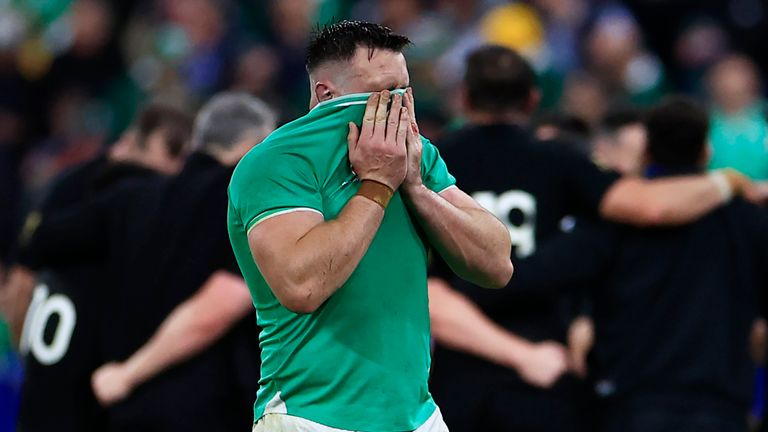
Ireland’s 2023 ended in devastating fashion with another quarter-final exit at the World Cup, at the hands of New Zealand for the second-straight tournament
Skipper Johnny Sexton and Keith Earls retired in the aftermath, bringing to an end stellar careers, but also a sense Ireland’s true time to become world champions had been lost.
Farrell has committed to Ireland until after the 2027 World Cup and is odds-on to lead to the British and Irish Lions in Australia in 2027. The rebuild starts now and the big question is who dons the No 10 shirt in Marseille on February 2.
Within provincial rugby, there were contrasting fortunes for Leinster and Munster. The men in blue dominated the majority of the season, only to lose late on to their arch-rivals in Dublin in the URC semi-finals, and then in the Champions Cup final again a week later to La Rochelle – this time after sprinting out to 17-0 and 23-7 leads at the Aviva Stadium. The loss was Leinster’s third in succession in European Cup finals.
Munster began the season terribly, losing five from their first seven fixtures under new head coach Graham Rowntree, but though much of the campaign was spent worrying about qualification for Europe, a remarkable final season run away from home of four wins and a draw saw them all the way to the URC final against the Stormers in Cape Town, and a superb 19-14 success – the province’s first silverware since 2011.
Like previous campaigns, Leinster have made a strong start to the season both on the domestic and European front, but it has been a mixed bag so far for the other three, with inconsistency a common theme.
Women’s rugby at lowest ebb
While men’s rugby in Ireland is in a good place, the women’s game endured one of the worst years in its history.
Ireland finished a gruesome 2023 Women’s Six Nations dead last with the Wooden Spoon after losing all five matches by an average margin of over 30 points.
They were then placed into the third tier of the new WXV tournament during October, the result of which meant they played Kazakhstan, Colombia and Spain – beating the latter only due to a try with five minutes to play.
The side has gone from Six Nations champions in 2015 to bottom of the pile in 2023, having failed to qualify for the last World Cup in 2022 too.
Captain Nicola Fryday retired from international rugby at the age of just 28 – the second captain of the women’s side to do so in two years after Claire Molly in late 2021, who still plays for Bristol in Premiership Women’s Rugby.
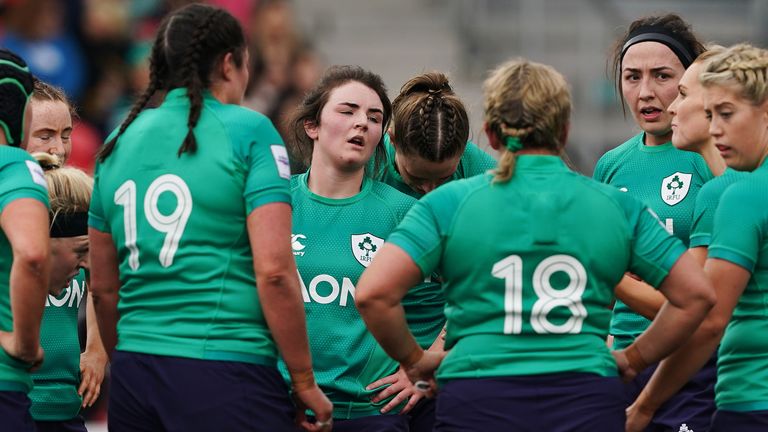
Ireland came last in the 2023 Women’s Six Nations, losing all five of their matches
All the while, the IRFU has come under huge scrutiny for their running of the women’s game. While France, England, Wales and Scotland have all professionalised their women’s teams, the same cannot be said of Ireland.
In April, an unnamed player expressed concerns of sexism in a Telegraph report, with the IRFU likened to an “old boys club”, with allegations players were denied protein supplements as they prepared for a summer tour to Japan and that the switch from white to blue shorts over period concerns was done without proper consultation with the squad.
The anonymous player also alleged squad members learnt they were dropped via email, with some omitted from mailing lists, while the IRFU are also said to have refused to explore the option of a “hybrid contracts” – a specific request from players – with the union instead favouring a “full-time or nothing attitude.”
The IRFU disputed all the claims in a statement, but as high performance director David Nucifora’s impending exit was confirmed – David Humphreys will replace him in 2024 – it was noteworthy there was no response from anyone in the women’s game.
Football: Republic of Ireland’s World Cup odyssey ends in management change
It was, for reasons good and bad, a landmark year for the Republic of Ireland women’s team.
All roads led to Australia and New Zealand, where Ireland made their maiden major tournament bow at the World Cup. In itself a historic achievement, but performances on the pitch struggled to catch fire while off-field issues overshadowed the build-up and conclusion.
Just weeks before the tournament began, allegations of body shaming were made against Ireland manager Vera Pauw, relating to her time in charge of Houston Dash in the USA’s National Women’s Soccer League. Pauw strongly denied the allegations, but they undeniably cast a shadow over Ireland’s preparations.
Captain Katie McCabe’s wonder goal in their second game against Canada was the highlight of a tournament which ended for Ireland after the group stage, having lost to Australia and Canada before drawing with Nigeria.
Pauw departed upon conclusion of the World Cup, with the FAI opting not to extend her contract.
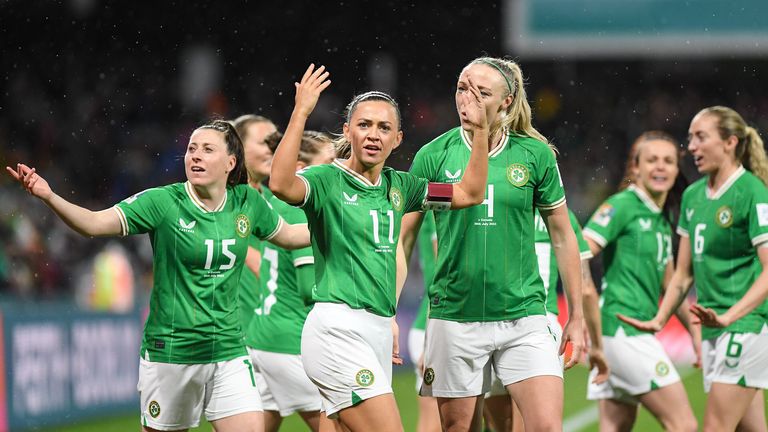
Captain Katie McCabe scored directly from a corner to put Ireland ahead against Canada, but they could not hold on to the lead
Eileen Gleeson, assistant under Pauw, was appointed interim manager and guided the team through an outstanding Nations League campaign. Ireland won all six of their games, scoring 20 goals and conceding just two – ensuring they will be in League A for the Euro 2025 qualifiers.
That success no doubt informed the FAI’s decision to hand Gleeson the reins on a permanent basis on December 18, with the Dubliner now tasked with leading their Euro 2025 qualifying campaign.
It was also a year of change for Northern Ireland, who themselves were on a managerial hunt after Kenny Shiels departed in January following a four-year stint which saw the team reach their first major tournament at Euro 2022.
Former Chelsea assistant coach Tanya Oxtoby took up the reins in August, and oversaw a Nations League campaign in which Northern Ireland recorded two wins, a draw and three losses.
A third-placed finish in their group means they face a two-legged play-off with Montenegro in February, where they must win to avoid dropping into League C for the upcoming Euro 2025 qualifiers.
Time runs out for Kenny and O’Neill’s return fails to spark NI response
Like their female counterparts, the Republic of Ireland men’s team opted for a change of manager.
After three and a half years in charge, Stephen Kenny left upon expiry of his contract after a disappointing Euro 2024 qualifying campaign.
Drawn in a group with France and the Netherlands, a top-two finish was always a tall order, but Ireland never gave themselves a chance of reaching next summer’s tournament. They won just two of their eight games, both against minnows Gibraltar, and there was little clamour for Kenny to be given another bite at the cherry as Ireland seek a fresh start.
As for Northern Ireland, hope abounded as Michael O’Neill – back for a second stint as manager having previously taken the side to Euro 2016 – returned to guide them through what looked on paper to be a very favourable Euro 2024 qualifying group.
However, disappointing early home losses to Finland and Kazakhstan, coupled by a defeat by Denmark in Copenhagen, realistically ended NI’s hopes of qualification after only four games.
A 2-0 win over Denmark in their final qualifier in November did however see Northern Ireland bow out with a spring in their step.
Having struggled with injuries, O’Neill will hope to have some key faces back to pair with his young players in 2024.
Golf: McIlroy and Maguire bring it home for Europe
It was another year to remember for Ireland’s golfers with Rory McIlroy once again leading the charge.
A Scottish Open win took his tally of PGA Tour titles to 24, before the world No 2 claimed the Race to Dubai title for the fifth time. However, McIlroy’s 2023 peaked in the early autumn heat of Rome.
After a poor display at Whistling Straights in 2021 ended in tears, McIlroy turned the page on his own Ryder Cup story to claim four points from a possible five at Marco Simone to finish as the highest individual scorer in the 2023 competition. Leading the charge both on the course and off it, when he became involved in a heated car-park confrontation with Team USA caddy Joe LaCava, as Europe regained the trophy.
Despite the successes, the hunt for the elusive fifth major goes into another year after some more near-misses at the flagship events.
McIlroy came second at the US Open behind Wyndham Clark, while there were top-10 finishes at the PGA Championship and The Open. He remains one of the game’s leading lights, and the Holywood man now enters 2024 hoping to claim a major title for the first time in a decade.
His compatriot Shane Lowry also played his part in Europe’s Ryder Cup redemption, winning 1.5 points from three matches while also claiming three top-20 finishes in 2023’s majors.
It was a breakthrough year for 20-year-old Tom McKibbin, who became Irish golf’s youngest tour winner since McIlroy (who hails from the same town in County Down) when he won the DP World Tour’s European Open in June.
Meanwhile, Cavan’s Leona Maguire enjoyed another fruitful year, the highlight of which came at the Solheim Cup.
Maguire shone, as she did on tournament debut in 2021, winning three points including a crucial 4&3 win over Rose Zhang as Europe retained the cup after a 14-14 draw.
Maguire also claimed her second LGPA Tour title as a spectacular final round saw her clinch a two-shot win at the Meijer LPGA Classic.
A good year could have been a great one, with Maguire taking a one-shot lead into the final round of the Women’s PGA Championship, before shooting a disappointing 74 on the final day with China’s Ruoning Yin winning the major. Maguire’s compatriot Stephanie Meadow impressed at the tournament, finishing tied for third.
Boxing: Revenge for Taylor after first pro defeat as five qualify for Olympics
The main headline from an Irish boxing perspective this year saw Olympic legend Katie Taylor suffer the first defeat of her professional career at the 23rd attempt, losing to England’s Chantelle Cameron in Dublin by majority decision in May.
Seeking revenge, Taylor fought Cameron again on November 25 in Dublin, becoming a two-weight undisputed world champion when she showed her mettle to win by majority decision. Taylor has since said she would fight Cameron again, and has made no secret of her desire to do so at Croke Park.
Elsewhere in the Irish boxing world, Belfast’s Michael Conlan suffered two defeats in 2023, having only previously lost once in 19 professional bouts. The 32-year-old lost to Mexico’s Luis Alberto Lopez by TKO in the fifth round of their fight in May for the IBF featherweight title, and then lost to Englishman Jordan Gill by TKO in the seventh round on December 2 for the vacant WBA International super-featherweight title.
Earlier this year, Kellie Harrington, Ireland’s Tokyo Olympic gold medallist, and four other Irish boxers qualified for the Paris Olympics: Aoife O’Rourke, Jack Marley, Michaela Walsh, Dean Clancy. Roscommon’s O’Rourke and Dublin’s Marley are considered exciting medal prospects.
GAA: Dublin at the double as Limerick continue dominance
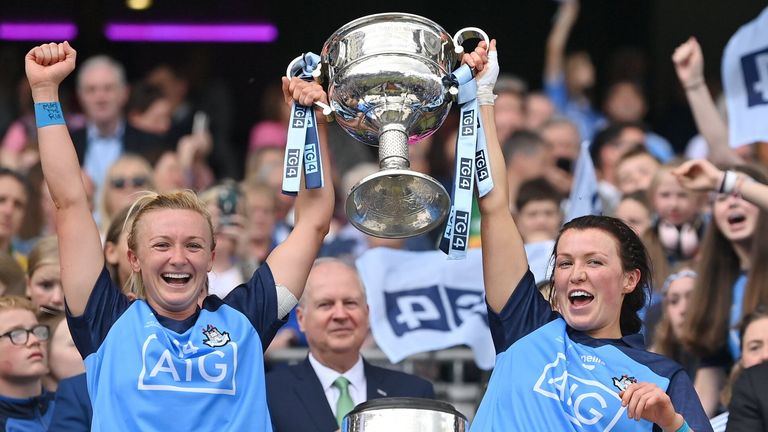
Dublin captain Carla Rowe (left) and Leah Caffrey lift the Brendan Martin Cup after their All-Ireland final victory over Kerry
Just when you thought the Dubs were in a downturn.
After a three-year absence, the Sam Maguire and Brendan Martin Cups are back residing in the capital. Their previous stays were lengthy ones, six and four years respectively, but football is a much more competitive environment these days.
The Dublin’s women’s team will attest to that, having watched neighbours Meath rise from the intermediate ranks and win back-to-back All-Irelands at senior level. Plenty of motivation, then, and Dublin lay down a marker by twice beating the defending champions in the Leinster Championship.
A two-point home loss to Kerry in the All-Ireland group stages proved a momentary setback. Dublin’s winning margin across the next three games was over 15 points as they booked a return date with a Kingdom side chasing a league and championship double.
A first final in the women’s code between these two footballing heavyweights was all but over by the interval, Dublin leading by seven after former Ireland rugby international Hannah Tyrrell kicked eight first-half points. With Mick Bohan on board for an eighth season as manager, they will again be among the frontrunners in 2024.
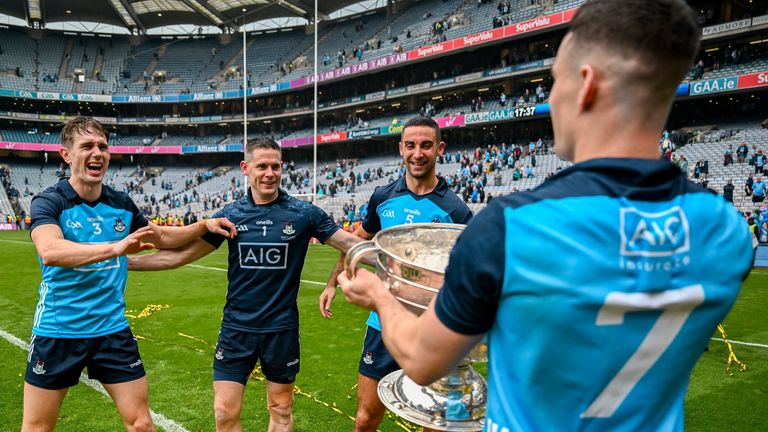
James McCarthy, Stephen Cluxton and Michael Fitzsimons are no strangers to getting their hands on the Sam Maguire Cup
The Dublin men’s team timed their run to perfection as they became the first non-Division One team to win the All-Ireland since Armagh in 2002.
Dessie Farrell’s side began the year in the unfamiliar surrounds of the league’s second tier, which allowed them to stay under the radar and slowly build up a head of steam.
After yet another cakewalk in Leinster – it’s now 13 provincial titles in a row and 18 in 19 seasons – a below-par draw with Roscommon in the All-Ireland group stages provided Dublin with a timely shot in the arm. They powered to a mouth-watering final with defending champions Kerry, for whom David Clifford was shooting the lights out all summer. However, the Kingdom talisman was unable to hit his usual high standards in the decider, and a late scoring burst saw Dublin home.
Captain James McCarthy has committed to another season as he chases a record-equalling 10th All-Ireland medal, while Stephen Cluxton could follow suit as the Boys in Blue look to retain their crown.
Derry, with Mickey Harte at the helm, will have something to say about that, as will the likes of Armagh, Galway and Kerry. However, Gaelic football remains a sport in crisis, blighted by packed defences and incessant handpassing. Armagh and Crossmaglen great Aaron Kernan described the sport in its current guise as “boring” and “monotonous” and warned it could get even worse before it gets better, while the split season continues to divide.
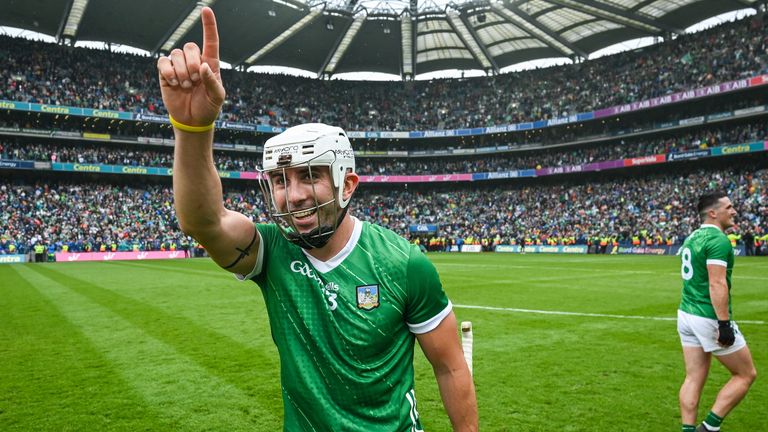
Aaron Gillane was Limerick’s leading scorer with 3-47 in seven championship matches
No such concerns in hurling, split season aside, as Limerick head into 2024 bidding to become the first county to win five All-Ireland Senior Hurling Championships in a row.
They recovered from a loss to Clare in the Munster Championship group stages, their first championship defeat since 2019, to book a rematch with their neighbours in the final, where a one-point success secured a fifth consecutive provincial title.
Limerick reinforced their reputation as a second-half team with devastating performances at Croke Park, overturning half-time deficits against both Galway and Kilkenny in the semi-finals and final respectively. John Kiely’s men saved their best performance for the final, outscoring the Cats by 0-19 to 0-5 in a majestic final half-hour. Can anyone stop their drive for five?
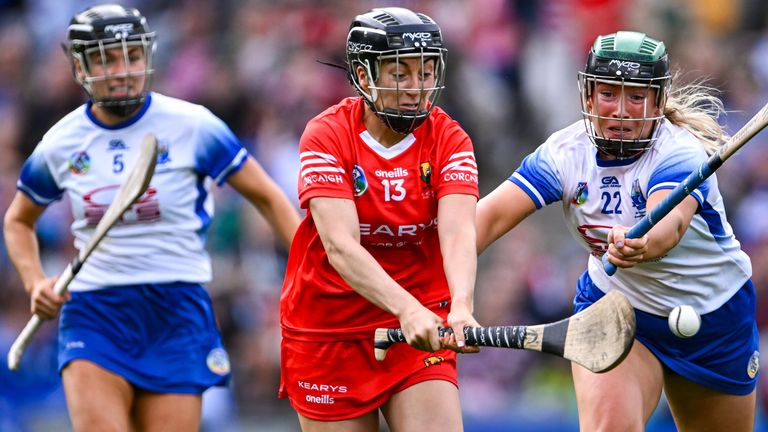
Cork captain Amy O’Connor completes her incredible hat-trick against Waterford
Speaking of majestic, Amy O’Connor was Cork’s hero as they ended their five-year wait for an All-Ireland Senior Camogie Championship.
O’Connor produced one of the moments of the year when she smashed a hat-trick in less than two minutes during their dominant victory over a Waterford side appearing in their first All-Ireland final since 1945.
Olympics: Record medal haul should be target in Paris
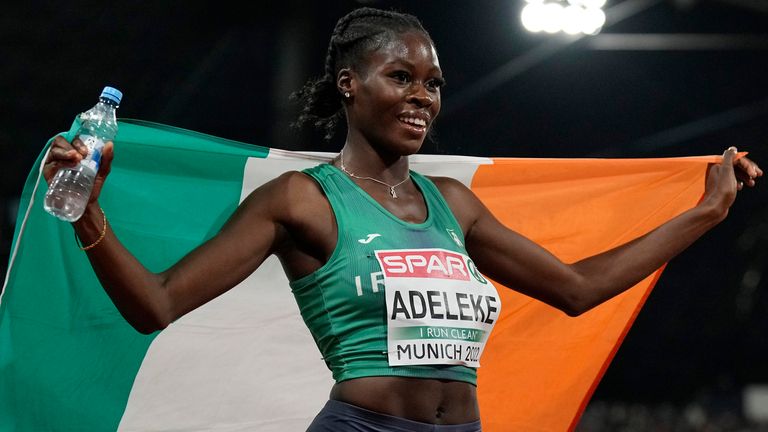
The sky is the limit for 21-year-old sensation Rhasidat Adeleke
Ireland record medal tally at an Olympics came in 2012 when they won six in London, and hopes are high they can match or perhaps even better that in Paris this summer.
Tallaght sensation Rhasidat Adeleke has enjoyed a record-breaking 12 months and her upward curve will continue after deciding to turn professional. Rhys McClenaghan (pommel horse) is a back-to-back world champion while freestyle swimmer Daniel Wiffen will be targeting a medal in Paris after smashing the 800m world record.
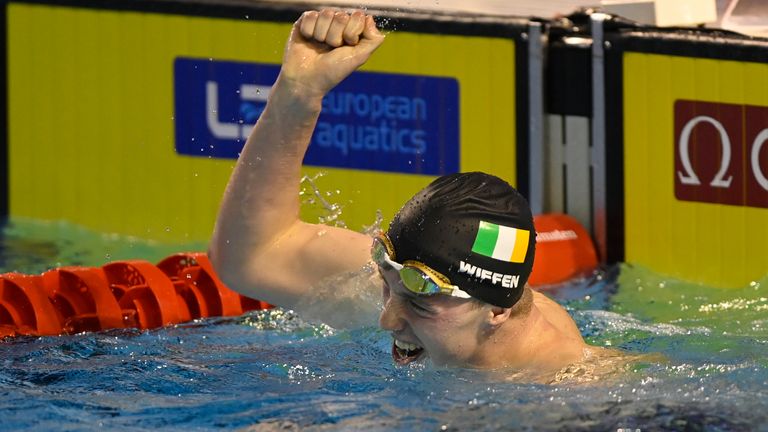
Daniel Wiffen smashed the 800m freestyle world record by almost three seconds
In Ciara Mageean and Sarah Healy Ireland possess two serious competitors in the 1500m. Mageean finished fourth in world-class company at the World Championships last August, with Healy joining the Down athlete and Sonia O’Sullivan as the only Irishwomen to run the 1500m in under four minutes.
Throw in Ireland’s rowing stars – Olympic gold medallists Fintan McCarthy and Paul O’Donovan claimed their third World Championship in September – and the long list of boxing contenders headed by Kellie Harrington, and this has the potential to be a ground-breaking Games.



